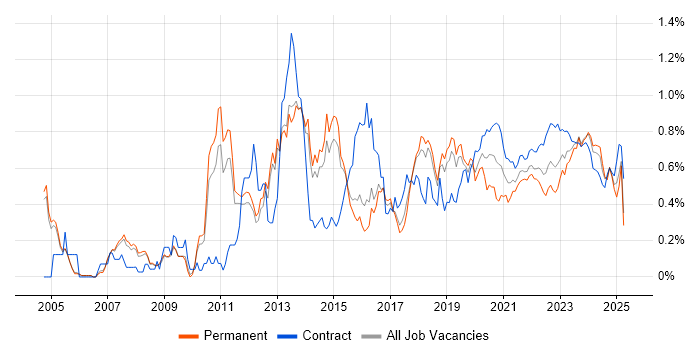Virtual Machine (VM)
UK > Work from Home
The table below provides summary statistics and salary benchmarking for remote or hybrid work requiring Virtual Machines skills. It covers permanent job vacancies from the 6 months leading up to 8 February 2026, with comparisons to the same periods in the previous two years.
| 6 months to 8 Feb 2026 |
Same period 2025 | Same period 2024 | |
|---|---|---|---|
| Rank | 331 | 355 | 294 |
| Rank change year-on-year | +24 | -61 | +185 |
| Permanent jobs citing Virtual Machines | 49 | 76 | 270 |
| As % of all permanent jobs with remote/hybrid work options | 0.31% | 0.48% | 0.97% |
| As % of the System Software category | 3.75% | 3.01% | 6.46% |
| Number of salaries quoted | 30 | 58 | 227 |
| 10th Percentile | £38,850 | £43,075 | £50,000 |
| 25th Percentile | £40,375 | £51,250 | £53,750 |
| Median annual salary (50th Percentile) | £58,750 | £67,500 | £57,500 |
| Median % change year-on-year | -12.96% | +17.39% | +4.55% |
| 75th Percentile | £61,875 | £85,938 | £63,750 |
| 90th Percentile | £85,000 | £93,250 | £75,000 |
| UK median annual salary | £60,000 | £57,836 | £57,500 |
| % change year-on-year | +3.74% | +0.58% | +4.55% |
All System Software Skills
Work from Home
Virtual Machines falls under the System Software category. For comparison with the information above, the following table provides summary statistics for all permanent job vacancies with remote or hybrid options requiring system software skills.
| Permanent vacancies with a requirement for system software skills | 1,308 | 2,526 | 4,182 |
| As % of all permanent jobs with a WFH option | 8.17% | 15.90% | 15.06% |
| Number of salaries quoted | 921 | 1,581 | 3,605 |
| 10th Percentile | £29,000 | £31,250 | £32,000 |
| 25th Percentile | £37,500 | £46,250 | £42,000 |
| Median annual salary (50th Percentile) | £55,000 | £62,500 | £55,000 |
| Median % change year-on-year | -12.00% | +13.64% | -8.33% |
| 75th Percentile | £75,000 | £83,750 | £72,500 |
| 90th Percentile | £90,000 | £112,500 | £87,500 |
| UK median annual salary | £50,500 | £57,500 | £50,000 |
| % change year-on-year | -12.17% | +15.00% | -9.09% |
Virtual Machines
Job Vacancy Trend for Remote/Hybrid Jobs
Historical trend showing the proportion of permanent IT job postings citing Virtual Machines and offering remote or hybrid work options relative to all permanent IT jobs advertised.

Virtual Machines
Salary Trend for Remote/Hybrid Jobs
Salary distribution trend for jobs with remote/hybrid work options citing Virtual Machines.

Virtual Machines
Salary Histogram for Remote/Hybrid Jobs
Salary distribution for jobs with remote/hybrid work options citing Virtual Machines over the 6 months to 8 February 2026.
Virtual Machines
Co-Occurring Skills & Capabilities in Remote/Hybrid Jobs by Category
The following tables expand on the one above by listing co-occurrences grouped by category. They cover the same employment type, locality and period, with up to 20 co-occurrences shown in each category:
|
|
||||||||||||||||||||||||||||||||||||||||||||||||||||||||||||||||||||||||||||||||||||
|
|
||||||||||||||||||||||||||||||||||||||||||||||||||||||||||||||||||||||||||||||||||||
|
|
||||||||||||||||||||||||||||||||||||||||||||||||||||||||||||||||||||||||||||||||||||
|
|
||||||||||||||||||||||||||||||||||||||||||||||||||||||||||||||||||||||||||||||||||||
|
|
||||||||||||||||||||||||||||||||||||||||||||||||||||||||||||||||||||||||||||||||||||
|
|
||||||||||||||||||||||||||||||||||||||||||||||||||||||||||||||||||||||||||||||||||||
|
|
||||||||||||||||||||||||||||||||||||||||||||||||||||||||||||||||||||||||||||||||||||
|
|
||||||||||||||||||||||||||||||||||||||||||||||||||||||||||||||||||||||||||||||||||||
|
|
||||||||||||||||||||||||||||||||||||||||||||||||||||||||||||||||||||||||||||||||||||
|
|||||||||||||||||||||||||||||||||||||||||||||||||||||||||||||||||||||||||||||||||||||
